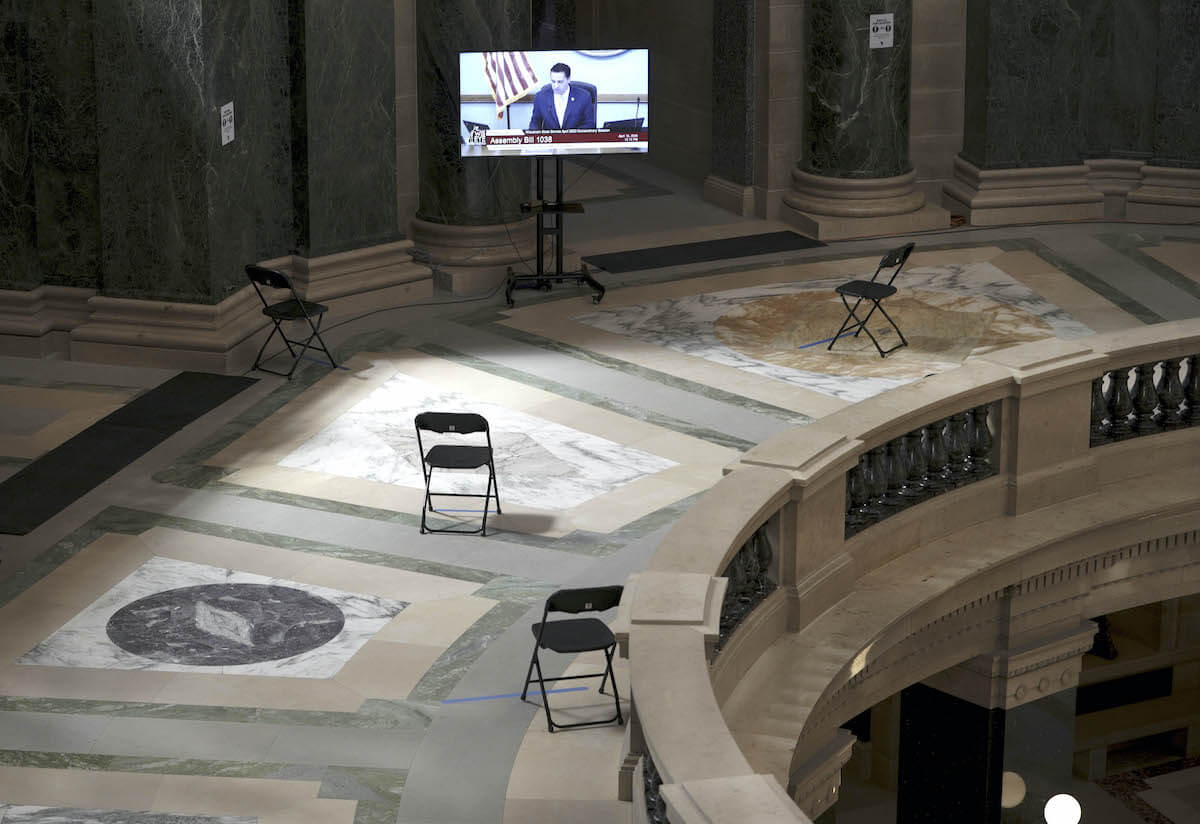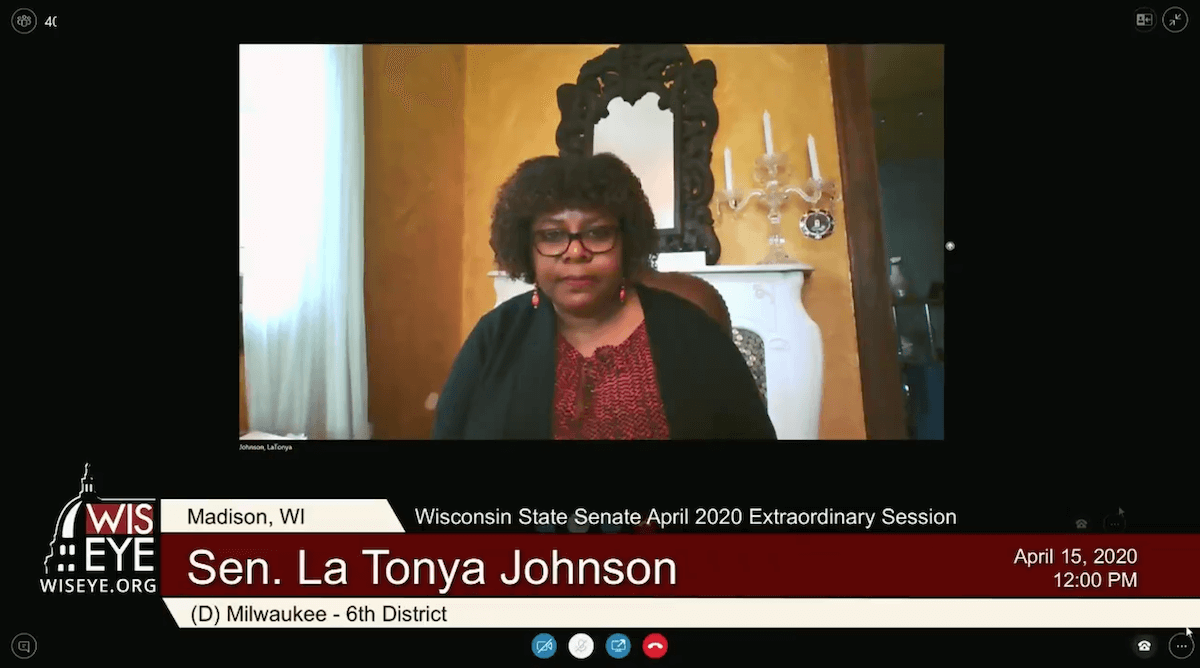
#image_title
#image_title
Governor signals more is needed for workers comp benefits, hazard pay, aid to small businesses, farmers
Not long after the Senate passed the state’s first COVID-19 relief bill, Gov. Tony Evers signed it, allowing millions of federal dollars to flow into state programs, while already promising to do more.
“Although I remain concerned about what is missing from this legislation, I have called on this bill to be sent over for my signature as soon as possible,” said Evers in a statement. “The bill I will sign falls short of what is needed to address the magnitude and gravity of what our state is facing, but I am not willing to delay our state’s response to the crisis.”
The bill was passed by the Assembly Tuesday and early Wednesday afternoon by the Senate. It largely paves the way for $2.2 billion in federal funding to reach agencies in need in Wisconsin. It waives the one-week waiting period to qualify for unemployment insurance and waives provisions so that the state can receive an additional $150 million in Medicaid funds each quarter.
Both were provisions strongly advocated for Evers.
Yet Republican and Democratic leaders alike said the bill is the first of what will be many to address the economic and health-related fallout from the spread of the coronavirus in Wisconsin.
“Know that healthcare workers, know that childcare workers, manufacturing, construction, tourism and small businesses still need our help,” said Senate Minority Leader Jennifer Shilling, D-La Crosse.

To date, 182 people have died from the virus and 3,721 residents have tested positive, including 646 healthcare workers, according to the Department of Health Services tracking website.
A controversial last-minute amendment to the bill made Tuesday by Assembly Speaker Robin Vos, R-Rochester, received no debate in the Senate. The amendment changed the bill by narrowing the definition of healthcare workers who could apply for workers compensation if they contract the virus.
It also places the burden of proof on the worker to show they contracted the virus while at work, making it more difficult for frontline workers to qualify.

Jim Palmer, executive director of the Wisconsin Professional Police Association, the state’s largest law enforcement group, said he approved of the version of the bill that the governor and lawmakers were working on. It would have provided workers compensation for most essential workers including grocery store workers, childcare providers and sanitation workers.
He said he knows of officers who are sick at home but can not get tested because their symptoms are not severe enough. As for the new provision that requires first responders and healthcare workers to prove they contracted the virus while interacting with someone else who was positive while at work, Palm said that is not even possible, largely due to privacy issues surrounding patient medical information.
When asked if the state was doing enough to protect essential workers, Palm said “absolutely not.”
During a televideo news conference organized by SEIU Healthcare Wisconsin, seven workers representing various health care sectors said shortages of personal protective equipment and a lack of sick leave and hazard pay is endangering their lives and those of their families and other community members.
“When I accepted a job as a housekeeper, I never thought I might be signing my death certificate,” said Kathy Hintz, a housekeeper at a hospital in Appleton.
Lisa Gordon, a certified nursing assistant at the Monroe Health Services nursing home, said a lack of enough masks and other protective gear increases the likelihood of a COVID-19 breakout at a site with an especially vulnerable population.
She and others said if they do get infected, they won’t have enough money to pay bills because they lack paid leave.
“If I get sick, I won’t have wages,” Gordon said.
Wisconsin’s COVID-19 bill does not address any of those concerns, a point raised by Sen. La Tonya Johnson, D-Milwaukee, while debating the bill.

She said in her district, which has been hardest hit by the virus, many people still get up and go to work because they are postal carriers, sanitation workers, pharmacy workers, police officers and firefighters, the essential workers who keep community services in operation.
“Nowhere in this bill does it say they will receive hazard pay,” Johnson said. “They get up and they do the unthinkable. And many of them do the unthinkable for far less pay than we’re making right now.”
Rep. Robyn Vining, D-Wauwatosa, is working on legislation called the Healthcare Heroes Act that would increase the dwindling supply of personal protective equipment like masks, gowns and gloves, and provide fully-paid sick leave, hazard pay and healthcare coverage. Details of the measure are still being finalized, she said Wednesday.
When asked where funding for health care workers’ COVID-19 concerns would come from, Vining pointed to $1.9 billion in federal money Wisconsin will receive to address virus-related issues. Additional money could come from the state, she said, but that may prove difficult given the Assembly’s action Tuesday.
“We are looking at options right now,” she said. “Health care workers are doing their jobs under difficult circumstances. Now it’s time for legislators to do our job.”
Evers agreed.
“This bill does not provide hazard pay or workers compensation for all frontline and critical workers like first responders, childcare providers and healthcare workers who are risking their lives going to work every day,” Evers said. “This bill lacks meaningful support for small businesses and farmers who are struggling to make ends meet and includes no additional investments in our businesses or farmers through the Wisconsin Economic Development Corporation’s successful 20/20 program.”
Politics

Biden marks Earth Day by announcing $7 billion in solar grants
The Biden administration on Monday announced the recipients of its Solar For All Program, a $7 billion climate program that aims to lower energy...

Opinion: Look for the helpers
In this opinion piece, Wisconsin resident Mary Vitcenda urges voters to vote in line with their values and “look for the helpers” as they cast their...
Local News

Stop and smell these native Wisconsin flowers this Earth Day
Spring has sprung — and here in Wisconsin, the signs are everywhere! From warmer weather and longer days to birds returning to your backyard trees....

Your guide to the 2024 Blue Ox Music Festival in Eau Claire
Eau Claire and art go hand in hand. The city is home to a multitude of sculptures, murals, and music events — including several annual showcases,...



